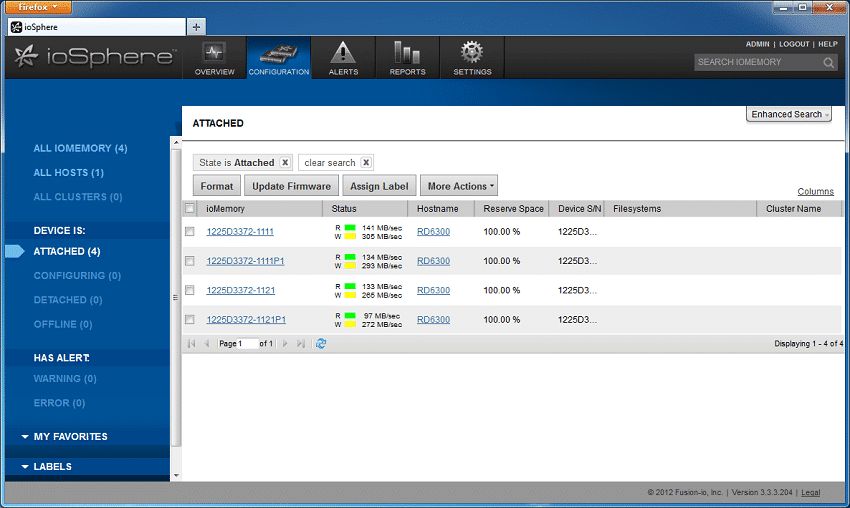You can identify the currently running FusionIO driver by running the following command as a root user on the system:
We would like to show you a description here but the site won’t allow us. Find many great new & used options and get the best deals for Fusion-io ioDrive 320GB PCI-Express Flash Drive SSD Storage Dell 9WHPF DW2VJ at the best online prices at eBay! Free shipping for many products!

delhanar01:~ # fio-status
Found 1 ioDrive in this system
Fusion-io driver version: 2.3.10 build 110
Adapter: ioDrive
Fusion-io ioDrive 320GB, Product Number:FS1-004-320-CS SN:465353
External Power: NOT connected
PCIE Power limit threshold: 24.75W
Sufficient power available: Unknown
Connected ioDimm module:

fct0: Fusion-io ioDrive 320GB, Product Number:FS1-004-320-CS
SN:465353
fct0Attached as 'fioa' (block device)
Fusion-io ioDrive 320GB, Product Number:FS1-004-320-CS SN:465353
Located in slot 0 Upper of ioDrive SN:465353
PCI:45:00.0
After you perform a kernel upgrade, you must rebuild the driver for the new kernel version to mount the block device /dev/fioa to /hana/log.

Dell Fusion Io Drivers
FusionIO drivers are available at the SanDisk Support website (through the security certificate warning).
Table 1 lists the software versions that Dell Technologies has tested.
Table 1.Tested FusionIO software versions
Card | Software version |
FusionIO Gen 1 | 2.3.10 |
FusionIO Gen 2 | 3.2.3 |
FusionIO driver update to a later version (2.3.1 to 2.3.10)
To update the driver:
- Stop the SAP HANA database, back up all data available in /hana/log,andthen unmount by running the following command:
unmount /hana/log
- Search for and remove the earlier versions of the driver and tools by running the following command:
rpm –qa|grep ‘(iomemory|fio)’

The command lists the following set of packages: fio-common, fio-util, iomemory-vsl, fio-sysvinit, fio-firmware
- Download the RPM packages in the preceding list from the SanDisk Support website(through the security certificate warning), and install them on the system.
See Rebuilding the kernel module for a different kernel version.
- After the driver version is updated, perform a firmware update by running the following command:
fio-update-iodrive
/usr/share/fio/firmware/iodrive_107053.fff
This step enables you to access the content of the FusionIO card.
Note: If the firmware is not updated, the card remains in minimal mode.
Rebuilding the kernel module for a different kernel version
You need the source package of the version of the tools and driver that you are running on your system. For this white paper, we used version 2.3.10 as the base version. Build the kernel package by running the following command:
rpmbuild --rebuild iomemory-vsl-2.3.10.110-1.0.src.rpm
As I described in a previous article, Fusion-IO cards are not natively supported by VMware ESXi.

After installing the card and restart the server, you can see that it claims there is no persistent storage available, not even a lun or local disk to be formatted:
So, we need to intall Fusion-IO drivers. They are available for ESX(i) 4.0, 4.1 e 5.0. Having driver in .vib format, you can use the usual method like any other third party driver inside an ESXi server, first copying the .vib file inside ESXi and then issuing this command from the command line (or via ssh):
Finished the installation you need to reboot ESXi, and when it comes up again you will have two new elements in ESXi: a new “IOMemory VSL” among the storage adapters, and a 600 Gb local disk (identified by ESXi as SSD):
From here, you can format the disk with VMFS and use it as a “common” local datastore, but also as host cache.
CIM Providers
If you want to monitor the card health and status, the only way to do it directly from ESXi is to install CIM Providers. Fusion-IO, like many other hardware vendors, gives you their CIM providers for several ESXi versions.
To install them in ESXi 5.0, you first need to place your server in maintenance mode.
You will then upload the software into ESXi, and you will install it using this command:
(no-sig-check is needed since the software is not digitally signed); you will finally put ESXi out of the maintenance mode.
Dell Fusion Io Driver
the Fusion-IO card is now ready to host virtual machines.